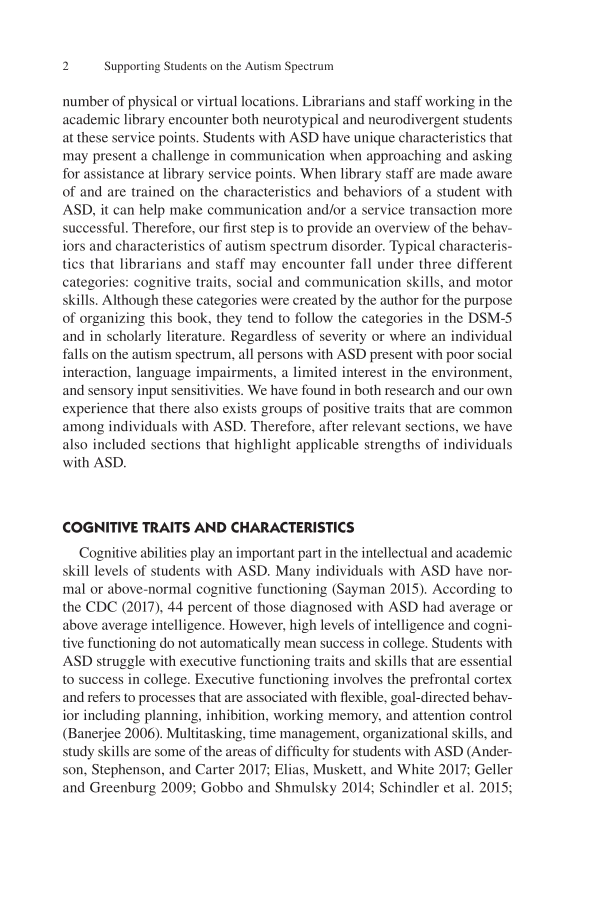2 Supporting Students on the Autism Spectrum number of physical or virtual locations. Librarians and staff working in the academic library encounter both neurotypical and neurodivergent students at these service points. Students with ASD have unique characteristics that may present a challenge in communication when approaching and asking for assistance at library service points. When library staff are made aware of and are trained on the characteristics and behaviors of a student with ASD, it can help make communication and/or a service transaction more successful. Therefore, our first step is to provide an overview of the behav iors and characteristics of autism spectrum disorder. Typical characteris- tics that librarians and staff may encounter fall under three different categories: cognitive traits, social and communication skills, and motor skills. Although these categories were created by the author for the purpose of organizing this book, they tend to follow the categories in the DSM-5 and in scholarly literature. Regardless of severity or where an individual falls on the autism spectrum, all persons with ASD present with poor social interaction, language impairments, a limited interest in the environment, and sensory input sensitivities. We have found in both research and our own experience that there also exists groups of positive traits that are common among individuals with ASD. Therefore, after relevant sections, we have also included sections that highlight applicable strengths of individuals with ASD. COGNITIVE TRAITS AND CHARACTERISTICS Cognitive abilities play an important part in the intellectual and academic skill levels of students with ASD. Many individuals with ASD have nor- mal or above-normal cognitive functioning (Sayman 2015). According to the CDC (2017), 44 percent of those diagnosed with ASD had average or above average intelligence. However, high levels of intelligence and cogni- tive functioning do not automatically mean success in college. Students with ASD struggle with executive functioning traits and skills that are essential to success in college. Executive functioning involves the prefrontal cortex and refers to processes that are associated with flexible, goal-directed behav ior including planning, inhibition, working memory, and attention control (Banerjee 2006). Multitasking, time management, organizational skills, and study skills are some of the areas of difficulty for students with ASD (Ander- son, Stephenson, and Carter 2017 Elias, Muskett, and White 2017 Geller and Greenburg 2009 Gobbo and Shmulsky 2014 Schindler et al. 2015
Document Details My Account Print multiple pages
Print
You have printed 0 times in the last 24 hours.
Your print count will reset on at .
You may print 0 more time(s) before then.
You may print a maximum of 0 pages at a time.



































































































































































